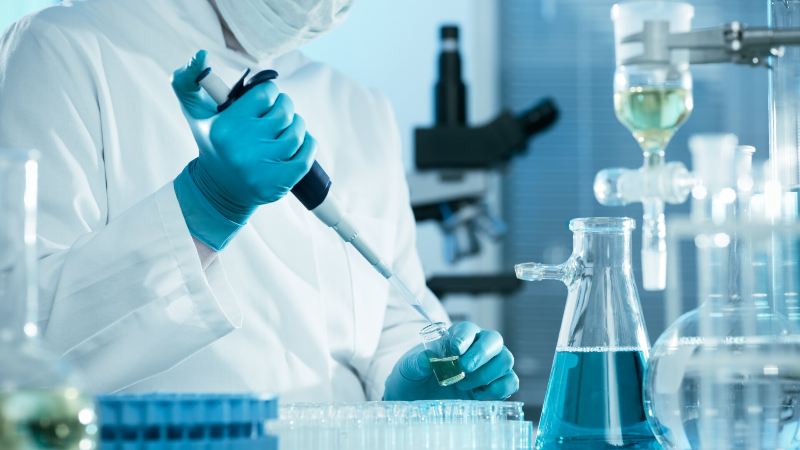What is Biochemistry?
Biochemistry is at its most basic, the study of the chemical processes occurring in living matter. Biochemistry is a diverse field of research that is a part of nearly all aspects of our lives each day, it is used to learn about the biological processes that take place in cells and organisms and may be used to study the property of biological molecules for a variety of purposes.
Biochemists use their research and understanding of living matter to provide new ideas and experiments to understand fully how life works. Biochemistry can help to support our understanding of health and disease and contribute to innovative developments in disease management, medicine, nutrition, genetics, and agriculture.
What 3rd level courses are available?
Universities and colleges in Ireland are offering Biochemistry courses in the following subject areas:
- Biopharmaceutical Processing – The study of the discovery, development, and processing of modern, medical drugs utilizing cell culture technologies.
- Biological and Chemical Sciences – An interdisciplinary approach into biological, biotechnology, medical, chemical, and pharmaceutical research areas.
- Cell and Molecular Biology – The study of cells and the molecules that combine to form them.
- Biochemistry – The study of living organisms at cellular and sub-cellular levels for entry into medicine, dentistry, and pharmacy.
- Genetics and Cell Biology – The study of genetics and cell biology and the scientific applications and the investigation, diagnosis, and treatment of disease.
- Biochemistry and Molecular Biology – The study of exploring life at the molecular level for a career in biomedical and biomolecular science.
Studying Biochemistry in college
Many full-time Biochemistry courses run anywhere from 1 year to 4 years depending on the course and modules selected. There are also part-time courses and night courses available so you can be sure to fit in your studies no matter what your schedule is like.
Courses will cover all theory work through lectures, assignments, tutorials, and taught modules. Assessments will take place continuously with written examinations and practical assignments combined to achieve a qualification.
You could also consider work experience or an internship in a pharmaceutical or biotechnical laboratory or a research institute and will help to boost your chances of finding a job. Opportunities also exist to take a placement abroad, expanding your career prospects. Work Experience will not only allow you to obtain a deeper knowledge and understanding of the industry, but it will also give you a chance to do some essential networking with other professionals in the industry and make useful connections.
Career options
After completing a course in Biochemistry you will be able to get started in a career that uses specific knowledge of the practical and technical skills needed for laboratory-based work and research.
Biochemistry graduates are typically employed in the industry. Typical employers include pharmaceutical, biotechnology, food, water, and agricultural companies. Small companies employ biochemists to provide specialist services, such as toxicological studies.
Opportunities exist in public health laboratories, environment agencies, forensic science services, research institutes, and universities. Other employers include scientific and medical publishers and the Intellectual Property Office (as patent examiners). You can also use your biochemistry skills and knowledge in areas such as sales and marketing, where you could be selling the latest technology, and law firms dealing with scientific cases.
Working hours will depend on whether you are employed by a company with set business hours or if you are self-employed and freelance for companies depending on their current needs.
Biochemists usually work forty to fifty hours per week, with occasional weekend and evening work to meet deadlines or to attend and observe experiments.
Related jobs include:
- Biochemist
- Pharmaceutical Chemist
- Physician
- Professor
- Forensic Scientist
- Toxicologist
- Forensic Analyst
- Food Scientist
- Research Scientist
- Molecular Geneticist
- Biotech or Pharmaceutical Sales Representative
- Biomedical Engineer
- Biomedical Scientist
- Laboratory Supervisor
- Laboratory Technician
- Cytologist
- Science Journalist
Further study
After completing a course in Biochemistry you may choose to pursue further study in a specialist field to increase your knowledge base and skillset. Postgraduate study can also be used as a means to change career focus or to gain professional qualifications required to practice in certain career areas such as Science Journalism and Food Science.
With a biochemistry degree, you can also apply for graduate entry to medicine, dentistry, and veterinary science.
FAQ
Are there any particular qualities you need to study Biochemistry?
Biochemists should have excellent analytical and problem-solving skills. You should have an interest in research and observation and be able to communicate well both verbally and in writing for reports and planning.
Who is the father of Modern Biochemistry?
Carl Alexander Neuberg (29 July 1877 – 30 May 1956) was an early pioneer in biochemistry, and he is often referred to as the “father of modern biochemistry”.
Where can you find biochemistry in daily life?
Biochemistry is applied in a wide range of areas that we all engage with daily, including medicine, dentistry, industry, and agriculture, and food science.
Where can I study Biochemistry?
Explore your options here
Did You Know?
· Biological molecules are based on the element carbon. It can form 4 bonds with itself or with other elements.
· Diamond and graphite are both entirely made of carbon and nothing else
· Organisms constantly take in a range of chemicals, using them to make other substances that they need.
· If you stretched out your entire DNA from just one cell it would be 2m long
· The only two non-silvery metals are gold and copper
· Glass is a liquid, it just flows very, very slowly
· A rubber tire is technically one single, giant, polymerized molecule












Comments